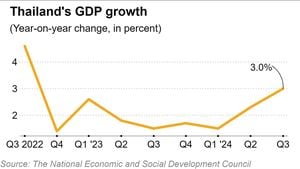Starting on February 24, 2025, the much-anticipated Maslenitsa celebration will commence across Russia, marking the festival of winter's farewell and the joyous heralding of spring. Known also as Cheese Week, this event serves as the final festive halt before the solemnity of Great Lent begins. It's not just about partaking of delicious blini—pancakes considered to symbolize the sun and the arrival of warmth—but it also involves vibrant community rituals bound by centuries of tradition.
The Maslenitsa festivities this year will last until March 2, precede the Great Lent beginning on March 3 and lasting until Easter on April 20. Each day of Maslenitsa is assigned specific activities and rituals closely tied to the essence of community and the festival's goals of reconciliation and celebration.
Historically, Maslenitsa likely has roots tracing back to pagan traditions celebrating the winter and welcoming spring. Over time, as Christianity spread, it was assimilated with Christian beliefs. Maslenitsa is characterized by considerable communal joy and warmth, capturing the spirit of family gatherings and societal togetherness through various activities and shared meals.
This year’s Maslenitsa progresses through distinct daily themes:
- Monday - Meeting: This day begins the festivities. Traditionally, families prepare to welcome the holiday, decorating homes and baking blini, the first of which is offered to those in need. Preparatory activities mirror the spirit of hospitality.
- Tuesday - Flirts: This day is known for matchmaking, with young people seeking potential spouses. Snow slides are fashioned, and games are played, fueling the festive atmosphere.
- Wednesday - Delicacies: Known as the day when sons-in-law visit their mothers-in-law for pancakes, this day emphasizes rich feasts and family traditions. It's also the time to showcase one's best cooking skills as guests gather around the table.
- Thursday - Revelry: Heralding the start of the main festivities, all work ceases, and people engage deeply with carnival games, sledding, singing, and dancing. It's about letting go and celebrating community.
- Friday - Mother-in-law’s Evenings: A way for sons-in-law to show respect, this day sees visits from mothers-in-law, emphasizing hospitality and family ties.
- Saturday - Sisters-in-law's Gatherings: Nurturing familial bonds, this day involves welcoming relatives from the husband's side, fostering unity and warmth among families.
- Sunday - Forgiveness Sunday: The final day of Maslenitsa, when people seek forgiveness from one another to enter the Great Lent with pure hearts. This day culminates with the symbolic burning of the effigy of Maslenitsa, signaling the culmination of winter and hope for spring.
The vivid and lively essence of Maslenitsa reflects not just the historical significance but also the values of community cohesion and cultural identity upheld through generations. The burning of the effigy serves as both farewell to winter and celebration of the promise of growth and renewal as life springs back to the earth.
Many elements of Maslenitsa can be related to ancestral rites, including those celebrating the return of light and warmth. Blini, embodying the sun's circular nature, play the central role, regardless of the variety—be it wheat, buckwheat, or filled with sweet and savory ingredients, they symbolize abundance and prosperity.
While attending local Maslenitsa festivities, you might also notice how different regions interpret their own local customs—the way communities celebrate, the specific dishes served, and the way traditions are revived.
Overall, Maslenitsa stands as one of Russia's most cherished festivals, uniting generations through rich offerings, laughter, food, and the promise of warmer days ahead. Participatory traditions draw families closer, reinforcing bonds—whether through shared meals, communal laughter, or simply by enjoying the cultural kaleidoscope offered throughout this celebratory week.



